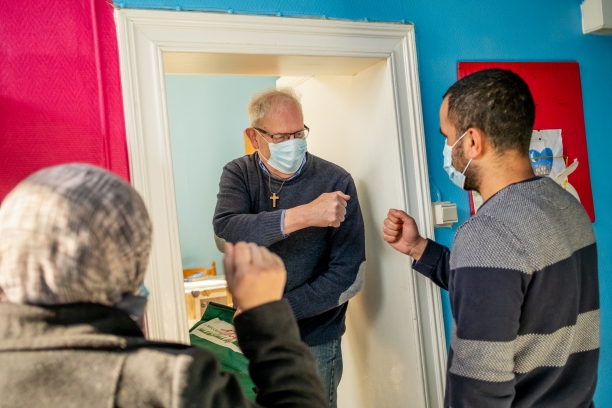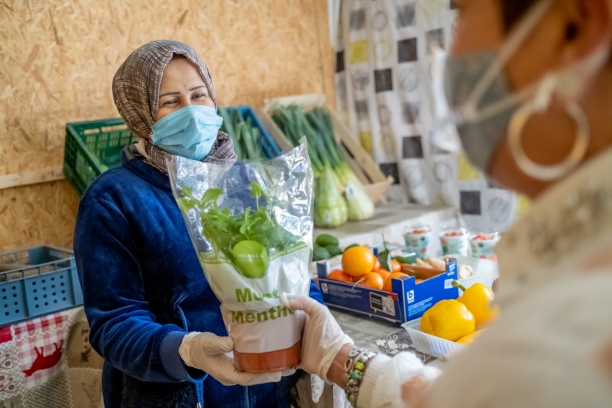Community sponsorship is a programme where local volunteers welcome and support resettled refugee families as they settle into their new home. In Belgium, the initiative is led by Fedasil, the Federal agency for the reception of asylum seekers, in partnership with Caritas International. Specifically, locals support with housing and offer a helping hand for a minimum of one year.
Meet Khadija, Mohammad, and their four children who have been able to count on this support and find a new home in a small town in Belgium.

Khadija, Mohammad and their children fled the war in Syria and were resettled in Belgium.
©Caritas/Isabel Corthier
After living through two years of the ongoing war, Khadija and Mohammad made the difficult decision to leave Syria to find a safe place for their family. They lived in Lebanon for seven years before being resettled to Belgium by UNHCR.
Despite some initial apprehension, the family’s fears about what to expect quickly faded away thanks to the warm welcome they received when they arrived in Belgium in 2020. "Before we left for Belgium, we were a little worried. We didn't know the country or the language, and we didn't know what life would be like here. When we were greeted at the airport by people with warm smiles, it was like a page was turned," says Mohammad. "Everything had been arranged for us, right down to dinner. There were even clothes ready for us, and that touched me deeply.”
Through the Belgian community sponsorship initiative, part of a larger resettlement programme, the family has had the opportunity to restart their lives in a new country in a welcoming environment. After being forced to flee Syria, the family spent seven years in Lebanon before being resettled to Belgium. Thanks to a local volunteer group who stepped in to help the family, Khadija, Mohammad, and their children have now settled into their new life in Beloeil, a village of about 14,000 people in the Belgian province of Hainaut.
Finding their way in a new environment

Father Vanneste is one of the many people who help the family find their way in their new environment
©Caritas/Isabel Corthier
Around 20 volunteers lent a helping hand, including Father Vanneste. Thanks to him, Khadija discovered the food bank "Ailes du Phoenix" where she started working as a volunteer only three weeks after her arrival in Belgium. "This way, I feel like I am giving something back to the community that has welcomed us," Khadija explains. In Syrian culture, giving is very important. The family is determined to make its own contribution.
As for Mohammad, he wants to focus on learning the language. "It's really the most important thing right now. Once I know the language, I will be able to find a job more easily. Then I will be able to get a driver's license, which will increase my chances of getting a job."
For Khadija, too, learning the language is crucial, so she practices her French as much as possible during her volunteering activities. Khadija and her colleagues are in charge of sorting, preparing, and filling food parcels. "I sometimes practice new words with my colleague Annie. Salade, tomate, poivron, pomme de terre,..." she says, laughing.

Thanks to the support of her colleague Annie, Khadija can contribute as full-fledged volunteer at the food bank.
©Caritas/Isabel Corthier
"What is so nice about the community sponsorship initiative is that the refugee families can build a network at local level and can count on the support of the many volunteers in addition to the social and employment orientation services and French classes offered through the integration programme in their region," says Bo Coenen, Integration Counselor at Caritas International.
Mohammad and Khadija’s son, Fares, initially had a hard time adjusting to this new situation. Fortunately, the family is surrounded by caring people, and their bonds with their new friends are growing stronger every day. Since meeting his friend Hugo, with whom he shares his passion for soccer, Fares is thriving. As he dreams of becoming a professional football player, Fares never misses an opportunity to train.

The local soccer club welcomed Fares with open arms. Together with his friend Hugo, he dreams of a career as professional player.
©Caritas/Isabel Corthier
"Days when we don't see anyone from the group feel strange. It's as if the day was not complete, as if something is wrong," says Mohammad, "both for the children and for us.”
Contagious solidarity
The community sponsorship initiative has also sparked an outpouring of solidarity in Beloeil. In addition to the scheme’s volunteers, many friends, acquaintances, and neighbors have come to support the family. They prepare meals, provide them with clothes, and volunteer as drivers and translators for the family.
Seeing solidarity in action is an inspiration for Khadija: "When I become fluent in French, I want to be part of a host group myself and eventually help another family find its place in Belgium. "For us, [...] it's almost like we’ve found a new family."
Changing lives
Community Sponsorship is a tangible, rewarding way for individuals and small groups to help resolve and respond to the situation of global forced displacement. It transforms the lives of refugees and the volunteers who are helping.
-------------------------------------------------------------------------------------------------
This story is based on an article first produced by Caritas International Belgium as part of the MIND project, which is supported financially by the European Union's Development Education and Awareness Raising Programme (DEAR). Its contents are the sole responsibility of Caritas International and do not necessarily reflect the views of the European Union.




